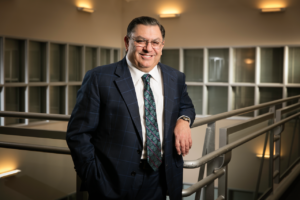
Arjang Assad
In July 2015, newly appointed Dean Dr. Arjang Assad arrived at the University of Pittsburgh Joseph M. Katz Graduate School of Business and realized something he’d wanted to do for years finally was possible.
He put things into motion quickly, forming a committee to design a new executive MBA program – specifically for executives in the healthcare sector: insurance, public health, pharmaceuticals, biotech. It would be run in partnership with the University of Pittsburgh Medical Center (UPMC), a commercial health system, and — Assad hoped — would address a growing need for healthcare professionals with management skills.
“I’ve been trying to create more of a healthcare presence wherever I have been,” Assad tells Poets&Quants. “I tried to do this in Buffalo too, where I was dean before. So when I came to Pittsburg and I saw the strength of the program, and the strength of the school of medicine, and UPMC, I felt that all the right pieces were in place for us to make something very special.”
THE NEW PROGRAM WILL LAUNCH MAY 2017
Now program preparation is nearly complete, and the Katz-UPMC Executive MBA in Healthcare Program (EMBA-H) will launch May 2017. Assad hopes to draw around 25 executives for the inaugural class, who will attend lectures two days a month for 19 months.
The EMBA-H is divided into five terms. About half the courses cover traditional EMBA material, like financial accounting, statistical analysis, decisions, strategy, and supply chain management. The other half have a medical theme: electronic medical records, insurance and risk management, comparative healthcare policy, and more.
Classes will be taught by current Katz faculty, and Assad says they’re incentivizing instructors to design new courses or modify existing classes to make the healthcare emphasis stronger. The intent, he says, is for every course to be infused with a healthcare theme. Many will be co-taught by people in the medical field. “We’re going to get people from our partner, UMPC, who are high-level executives in that organization, to co-teach some of these courses with us,” Assad says. “We’ll involve them in some of the delivery, not as faculty but as co-teachers.”
Students also will have a large project that will carry through the entire program. “They will choose a problem in healthcare where they will have access to data and information, and they will be able to analyze it and come up with better solutions,” Assad says.
A COHORT FROM DIFFERENT, ALLIED HEALTH INDUSTRIES
Assad says the need for healthcare professionals to have management skills is largely a result of healthcare costs and a rapidly changing regulatory environment. In the last few years, he says, the Affordable Care Act has prompted many people in the industry to question what the future of healthcare is going to look like.
“Some people believe we’re spending too much money and not getting enough positive outcomes. And people have looked at other countries and think some people are spending less money, getting better results,” he says.
Assad hopes the EMBA-H will bring together a class with significant experience in various health-related fields. “I find when you have that kind of cohort, with people from different hospitals, different health plans, and different allied health industries together in the same room, interacting, what they lend to each other is huge,” he says.
CASTING A WIDE NET
So, Assad says, Katz is casting a wide net, looking for people with at least 10 years of experience in health care leadership, administration, or clinical settings.
“We are looking at physicians of course,” he says. “But also other professions and industries — like people who are making devices for medical use, or people in pharmaceuticals, or nursing.”
Assad says they’ve already started recruiting, and the first wave of interest has come from health professionals locally. They hope to expand their reach to other regions as they continue advertising the program.
Something he isn’t worried about: attracting enough students. For the first class of 25, Katz already has had 80 serious inquiries.
“There are a number of similar programs, but nothing exactly like ours,” he says. “And generally speaking, there’s a lot of sensitivity now, concerning getting a more efficient system and producing better health and well-being results in the general populace. We are tapping into this interest.”





Questions about this article? Email us or leave a comment below.